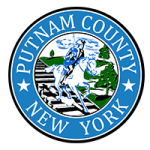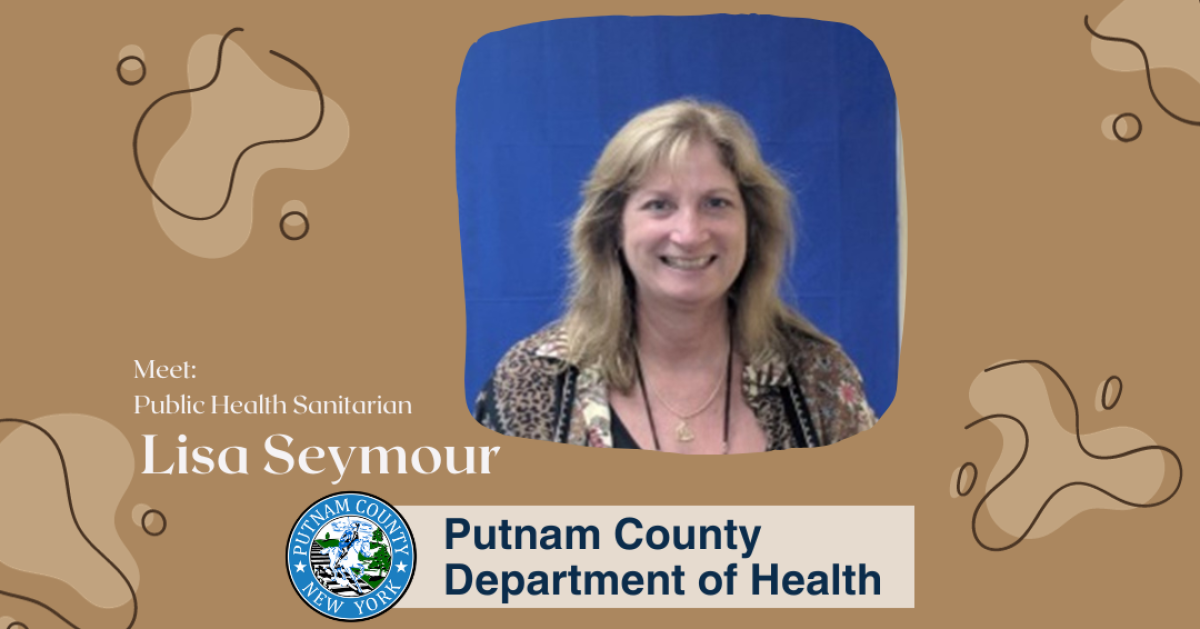
News & Press Releases
The Putnam County Department of Health is made of several divisions all working towards improving and protecting the health of the community. Click on one of the options below to learn more about that division.

PCDOH Highlights Food Safety with Staff Spotlight
Food safety might not be something you think about every day, but for the public health sanitarians at the health department, it is front and center. Ensuring proper food handling and serving by local restaurants and other food service establishments is paramount to protecting the health of Putnam County residents from foodborne illness. Working with restaurants and teaching them the best ways of keeping food safe is just one of the many tasks of Public Health Sanitarian Lisa Seymour, who has over 37 years of experience in the health department. Lisa answered some questions about her work and what it means to her to serve the public working at the Putnam County Department of Health:
What is your favorite part of being a Public Health Sanitarian?
Knowing that I have made the community a safer place for residents and visitors in Putnam County.
What does your day-to-day work look like?
Each day is different. After I get necessary paperwork out of the way, I have a lot of flexibility. I may be inspecting delis, restaurants, a children’s camp, or a motel, carrying out a dye test for a potentially leaking septic system, or investigating a foodborne illness.
What do you wish the public knew about your job?
We are behind the scenes regularly checking certain facilities to make sure Putnam residents are safe when visiting. For example:
- Making sure the food you eat at a deli or restaurant is safe, meaning that it is properly handled by staff and is at the proper temperatures. I also participate in the annual Food Operators Seminar, where educational sessions are held for food service operators.
- Ensuring that children’s camps, swimming pools, and public beaches have the properly certified and correct numbers of lifeguards, CPR, and First Aid staff on site.
- Looking for lead exposures in homes when there is a child who has tested high for lead levels.
- Check that hotels are safe and without known fire hazards.
What’s the best piece of advice you’ve ever received?
It is okay to say, “I don’t know.” Work, like life, is a learning experience, and it is fine to tell someone that you will look into it and get back to them.
We have an important job to do and need to do it well: to prevent injury and illness.
What have been some of the most important lessons you’ve learned throughout your career?
- Be ready to learn new things.
- Not jump to conclusions too soon. Examine the evidence and work through it.
- Clear communication with the public and staff at permitted facilities is paramount to success.
- You can learn from everyone you meet, interact and work with on a daily basis.
Is there a particularly rewarding experience you’d like to share?
It is rewarding when a foodservice operator thanks me for performing an inspection at their facility. It shows they value our opinion and the inspection process. They want to make their facility a better and safer place for their patrons.
An experience involving air quality from nearly 32 years ago was particularly memorable and rewarding. The health department received an illness complaint regarding dry cleaning fumes in an apartment located above a dry cleaner. My investigations and air sampling in collaboration with the NYS Department of Health revealed elevated levels of tetrachloroethane present in the apartment air. Further air testing of other dry cleaners in the area, and throughout the state, revealed similar results. This led to new regulations requiring dry cleaners using outdated equipment to upgrade to new dry-cleaning machines that eliminated air emissions and protected the public’s health.
Ensuring food safety for restaurants and other food establishments can be a complicated task. Do you have any recommendations for residents who want to ensure their own home kitchens are as safe as possible?
Of course. One of the best resources online is from the Centers for Disease Control. They have easy to follow advice here in their Four Steps to Food Safety:
- Clean: Washing hands often and cutting boards after preparing an item will prevent the spread of germs. Fresh fruits and vegetables should be rinsed.
- Separate: Germs from raw meat, poultry, seafood, and eggs can spread to ready-to-eat foods if they are not kept separate. One cutting board or plate should be only for raw meat, poultry, and seafood, and another for read to eat foods like bread or fruit.
- Cook: Foods should be cooked until the inside has reached a temperature that kills the germs that can make you sick. Using a food thermometer, and this chart, can tell you when your food is cooked enough.
- Chill: Refrigerate leftovers quickly and keep perishable foods in the refrigerator. This will keep foods out of the “danger zone” between 40˚F and 140 ˚F where bacteria can rapidly multiply.
Additional information about food safety can be found at:
Additional Articles
-
 New Community Health Survey Asks Residents: How Healthy Are We?
New Community Health Survey Asks Residents: How Healthy Are We? -
 Suicide Prevention in Putnam and Beyond
Suicide Prevention in Putnam and Beyond -
 Health Department Spotlight: Danny Reis
Health Department Spotlight: Danny Reis -
 Health Department Warns Residents About the Dangers of Lead Poisoning
Health Department Warns Residents About the Dangers of Lead Poisoning -
 Prevent mosquito breeding—dump standing water after rain
Prevent mosquito breeding—dump standing water after rain -
 Spotlight on the Public Health Corps Fellowship
Spotlight on the Public Health Corps Fellowship -
 The PCDOH Makes Summertime Living Easy…and Safe
The PCDOH Makes Summertime Living Easy…and Safe -
 Heat-Related Illnesses 101
Heat-Related Illnesses 101 -
 Tips for Staying Healthy During a Heat Alert
Tips for Staying Healthy During a Heat Alert -
 Free Rabies Vaccination Clinic Scheduled for July 13
Free Rabies Vaccination Clinic Scheduled for July 13
Welcome Message
The mission of the Putnam County Department of Health is to improve and protect the health of our community.
We strive to prevent the spread of disease, protect against environmental hazards, promote healthy lifestyles, ensure access to quality health services, and respond to disasters.
We encourage you to explore our website and contact us if you have any questions.
In the event of an emergency, Health Department staff are available 24/7. Please call 845-808-1390 to report a public health emergency, rabies exposure, communicable disease, water outage or sewer overflow.
If you are a member of the media and would like to contact the health department, please email
Contact the Department of Health
-
Office | 845.808.1390
-
Fax | 845.278.7921
-
Fax (Nursing) | 845.279.4104
-
Address | 1 Geneva Rd, Brewster, NY 10509
